ISO 27701 and GDPR
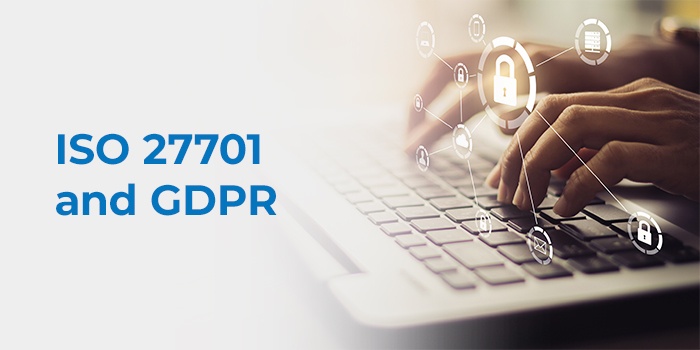 Modern consumers are entrusting more and more of their personal data to corporations. This has led to the rise of threats like cybercrime and information theft. Protecting this data from falling into the wrong hands is so critical that it has grown into its own industry. Companies now must comply with data privacy regulations to safeguard the sensitive information and data they collect from customers. Many countries have strong laws and regulations in place to strengthen data security. Several countries have passed legislation that regulates how organizations can collect data from their customers and sets certain privacy standards to safeguard that data.
Modern consumers are entrusting more and more of their personal data to corporations. This has led to the rise of threats like cybercrime and information theft. Protecting this data from falling into the wrong hands is so critical that it has grown into its own industry. Companies now must comply with data privacy regulations to safeguard the sensitive information and data they collect from customers. Many countries have strong laws and regulations in place to strengthen data security. Several countries have passed legislation that regulates how organizations can collect data from their customers and sets certain privacy standards to safeguard that data.
Organizations must meet these standards when they collect data and when they store this data in their systems. One regulation that has become integral in the European Union (EU) is General Data Protection Regulation (GDPR). GDPR applies to all members of the EU and the European Economic Area (EEA). Other countries have also introduced privacy regulations since then and update these regulations occasionally to ensure the security of customers' personal information. The latest update in the international standard for privacy and information management is ISO 27701, which is an extension of ISO 27001. This article discusses ISO 27701 and GDPR in-depth.
What Is ISO 27701?
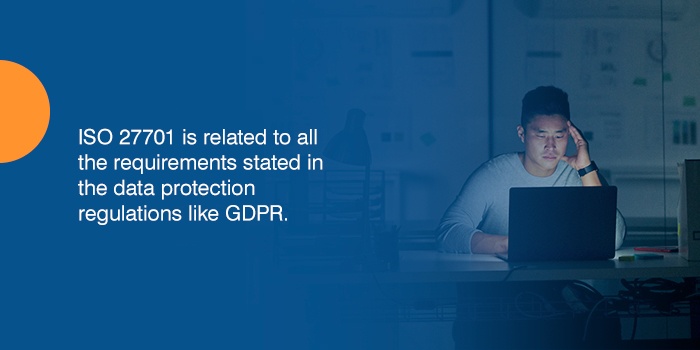
ISO 27701 is a data privacy extension to ISO/IEC 27001. As the international management system standard for the protection of privacy in information processing, ISO 27701 is related to all the requirements stated in the data protection regulations like GDPR. This standard is updated regularly, and the newest extension was written to support other privacy regulations like GDPR. ISO 27001 is a standard for implementing an information security management system (ISMS), while the ISO 27701 extension focuses specifically on implementing privacy information management.
This new and updated standard applies to both controllers and processors of personally identifiable information (PII). So, whether you’re a controller managing data collection and processing or a processor processing data on behalf of a controller, this standard applies. If you are already certified to ISO 27001, then you already have a head-start for becoming certified to ISO 27701 , as the controls and requirements map to the ISO 27001 standard. Implementing ISO 27701 will increase your privacy compliance and reduce the risk of privacy breaches.
Implementing ISO 27701 will ease your stakeholders’ privacy concerns and build their confidence in your organisation because it demonstrates that you have strong and effective systems in place to comply with privacy regulations. This standard allows you to expand on your previous standard, strengthening your ISMS and ensuring you have an effective system of privacy information management. Data protection acts are becoming more common these days; becoming certified to ISO 27701 can help you comply with these data protection acts.
What Is GDPR?
GDPR is is the conclusion of years of preparation and went into effect May 25, 2018. This regulation focuses on the protection and privacy of the personal data of individuals and expands on previous protection principles.
GDPR is the strongest data compliance regulation in the world. It's a set of rules that focuses on enhancing privacy protection for EU citizens. GDPR regulates how organizations can collect data and also imposes limits on what these organizations can do with this data. It also addresses the transfer of personal data outside the EU and EEA.
What Are the Key Principles of GDPR?
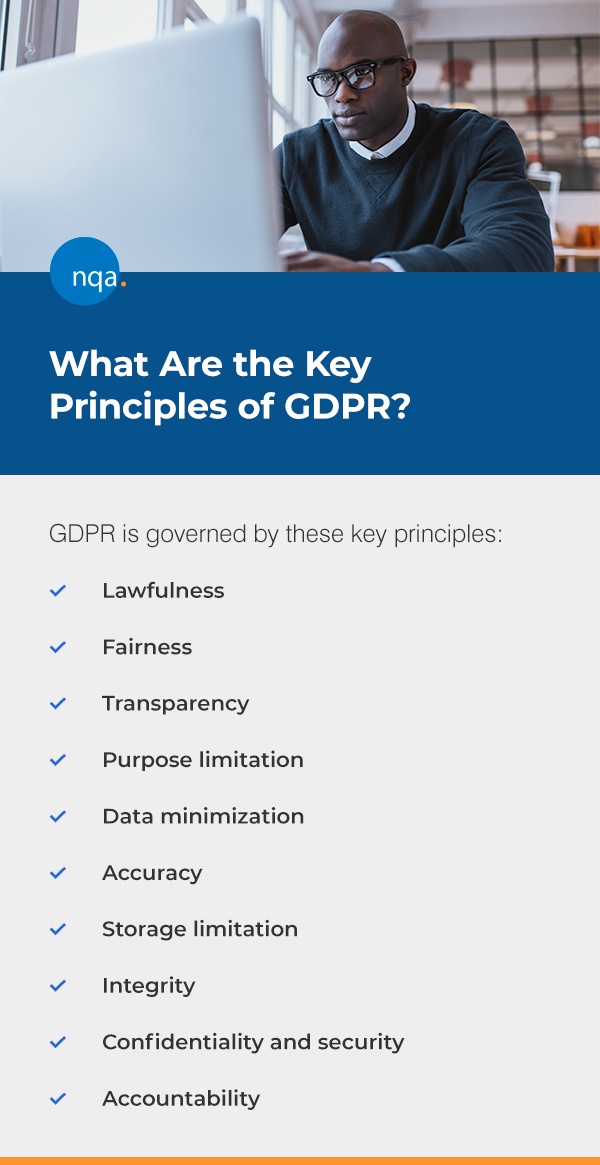
GDPR is governed by these key principles:
-
Lawfulness
-
Fairness
-
Transparency
-
Purpose limitation
-
Data minimization
-
Accuracy
-
Storage limitation
-
Integrity and confidentiality
-
Accountability
These principles guide how the data can be handled in order to ensure the privacy rights of data subjects. They serve as a framework designed to enhance the broader purpose of GDPR.
Who Does GDPR Apply To?
GDPR applies to all the organisations with an establishment in the EU and any organisations that provide goods and services to data subjects within the EU. This means GDPR applies in the U.S. to companies that interact with EU citizens. Every major worldwide company needs a GDPR-compliance strategy.
What Is GDPR Compliance?
GDPR compliance is a privacy framework to protect the data of EU citizens. Under GDPR, organisations must ensure that all private data are protected so it can’t be misused. GDPR only allows specific data gathering and requires organisations to manage and protect that data from exploitation. All organisations that process the personal data of EU citizens must adhere to these guidelines or face penalties for not complying with them.
ISO 27701 vs. GDPR
ISO 27701 and GDPR have many overlapping goals. Both aim to strengthen data privacy and focus on the process of obtaining, managing and protecting data. While they focus on the same overall requirement, ISO 27701 and GDPR have some key differences as well. Here are some of the key similarities, differences and overlaps between ISO 27701 and GDPR.
What Are the Similarities Between ISO 27701 and GDPR?
GDPR and ISO 27701 are both intended to protect consumers by laying out the groundwork for ethical data privacy standards. They complement each other and work together to achieve the same goals. Here's a rundown of what they have in common:
1. They Both Advise on Data Confidentiality
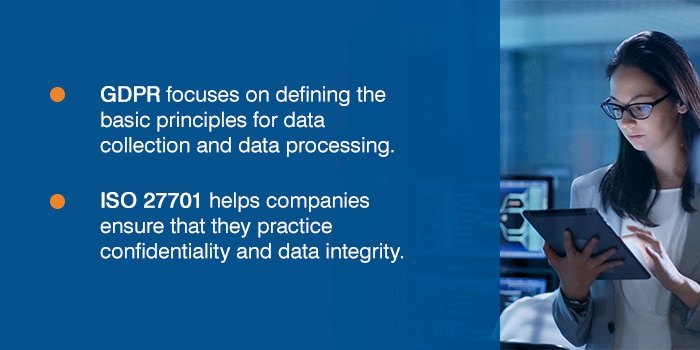
GDPR focuses on defining the basic principles for data collection and data processing. It provides a guideline to organisations to avoid unauthorised or illegal data processing and accidental data loss.
ISO 27701 also helps companies ensure that they practice confidentiality and data integrity. Several clauses define data security. ISO 27701 states that organizations must identify the threats related to security and determine IT security by creating a safety program.
2. They Both Emphasize Risk Assessment
Both GDPR and ISO 27701 have a risk-based approach to the security of data. The GDPR mandates companies assess risks to personal data before they process any high-risk data. It also requires the companies to identify risks before processing any sensitive information.
ISO 27701 also has a similar approach. It also states that companies should make rigorous assessments to identify any possible threats that can compromise the security of the information. ISO 27701 also advises organizations to take steps to ensure these risks are minimized.
3. They Hold Companies Accountable for Data Breaches
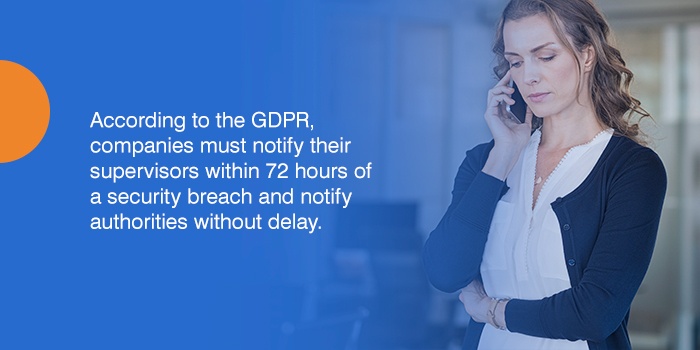
According to the GDPR, companies must notify their supervisors within 72 hours of a security breach and notify authorities without delay. These measures should be taken only when the compromised or stolen data pose a high risk to the rights and freedoms of the subjects.
ISO 27701 also specifies that companies must report any security breaches or incidents promptly to the authorities. Unlike GDPR though, it does not specify a time limit to do so. ISO 27701 only advises the companies to report it so corrective measures can be taken without any delay.
4. They Advise Data Protection at Every Stage
GDPR specifies that the companies must have technical and organisational measures in place when they are processing the data in the design phase. Companies must keep the data confidential from other parties. GDPR also states that companies should only use the necessary information or data at each processing phase.
ISO 27701 has similar clauses defining the same. It requires companies to understand the context and scope of the data they have collected from users and requires them to keep it confidential in all phases. It also directs the companies to conduct regular risk assessments to ensure complete security.
5. They Advise Companies to Keep Accurate Records
GDPR directs all companies to keep precise records of all of their processing activities, including the category of data and the purpose of processing. It also requires companies to keep a description of their organizational and technical security measures. These records can help the authorities in the time of a security breach.
ISO 27701 also directs companies to keep records of their security processes and requires companies to keep documents of the results of their risk assessments. It advises the companies to store all the information in a classified manner.
What Are the Differences Between ISO 27701 and GDPR?
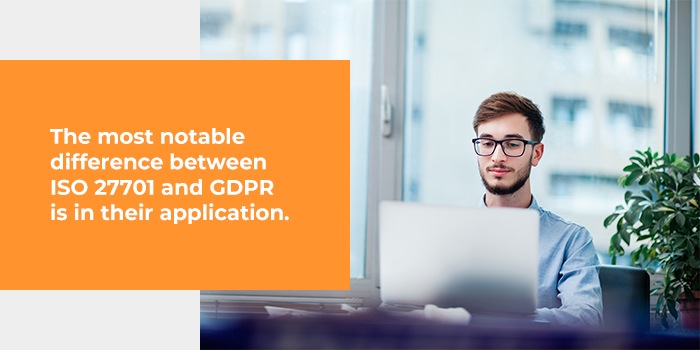
The most notable difference between ISO 27701 and GDPR is in their application. GDPR is a set of requirements that focuses on protecting personal data, data confidentiality and managing the risks to the rights of individuals. It provides a set of rules that all organisations must comply with. ISO 27701, on the other hand, provides actual guidance to organisations on how they can enhance their security measures, which policies they can implement and how they can reduce the risk of any incidents.
ISO 27701 is an extension to ISO 27001, the international standard for information security. Organisations must already be certified to ISO 27001 in order to implement and become compliant to ISO 27701.
GDPR-compliant companies must provide secure processing for personal data. They must apply appropriate measures to ensure complete data protection. However, GDPR doesn’t provide any technical details on how organisations should maintain these required security levels. ISO 27701 fills this gap and provides measures that companies can adopt to reduce any security threats. To put it another way, GDPR identifies the requirements, and ISO 27701 offers solutions.
Most people think that ISO 27701 compliance is the same as GDPR compliance, but this isn’t the case. However, when companies comply with ISO 27701, it provides them with a clear pathway for GDPR compliance as well. Together these two standards can help the companies develop strong enough measures to safeguard the personal information and data they collect.
It is extremely important to know that ISO 27701 and GDPR are not interchangeable. It’s not enough to comply with one and ignore the other. While some of the security aspects of these two standards overlap, GDPR is a much broader set of rules and guidelines. GDPR prescribes how this collected data should be processed, managed and handled.
Where Do ISO 27701 and GDPR Overlap?
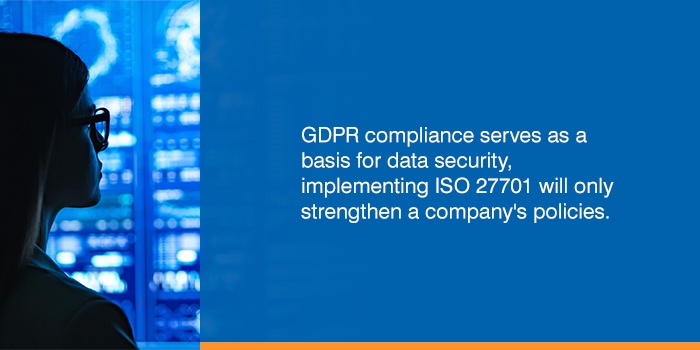
A GDPR-compliant company must handle all the data it collects with utmost care and is obligated to protect this data from falling into the wrong hands. ISO 27701 expands upon this framework and ensures that all the data a company collects is safe and secure. If GDPR compliance serves as a basis for data protection, implementing other information security standards like ISO 27701 will only strengthen a company's policies.
To be truly GDPR compliant, a company should understand what data they are allowed to store. GDPR also defines what you can do with the stored data. However, this doesn’t mean that ISO 27701 is not important. ISO 27701 ensures that none of the articles of GDPR are violated unintentionally. Many companies struggle with implementing the right policies and measures. ISO 27701 is meant to help to guide them. An appropriate information security management system is extremely essential to be a GDPR compliant. So, where GDPR ensures that your security measures are in place, ISO 27701 guides you to understand the security on a deeper level by implementing a Privacy Information Management System.
Is GDPR Certification Possible?
Not yet: GDPR allows for certification schemes, but currently none have been approved in the UK. For a company to certify its compliance with the GDPR legislation, it must meet several obligations. The organisation looking to get a GDPR certification must comply with the whole process monitored by a certified party. It must follow a specific certification scheme that tracks the process of collecting and processing data, and then an auditor must assess this process.
A GDPR certification helps you stay ahead of your competitors. It also ensures that your organization respects the privacy of your customers' data. GDPR certification proves that companies adhere to all the standards specified in the GDPR. Certification can help build trust with your customers since it demonstrates that you have strong data protection policies in place to protect them. Having a GDPR certification is extremely beneficial, and it can have many benefits for your company.
How Can You Become GDPR Compliant?
GDPR mandates that your organization must demonstrate compliance with the law. You can demonstrate this in three of the following ways:
-
You can make all your data and processes available as proof at the authority’s request.
-
You can adhere to an approved code of conduct for your business sector (none available in the UK).
-
You can get a GDPR certification (none available in the UK).
How to Get Certified to ISO 27701
ISO 27701 provides the requirements and guidance for a Privacy Information Management System. As an extension to ISO 27001it bridges the gap between the privacy and security of the data. It guides organizations in implementing policies to comply with GDPR and other personal data regulations.
If your organisation wants to become ISO 27701 certified to help you comply with GDPR, you must have an existing ISO 27001 certification, as ISO 27701 is an extension. If your company isn't certified to ISO 27001 already, you can implement ISO 27001 and ISO 27701 together. To comply with ISO 27001, you need an Information Security Management System (ISMS).
To implement ISO 27701, your company will have to design, build and implement a Privacy Information Management System (PIMS). The new system you implement must also abide by any international or national regulations that apply to your organisation.
An ISO 27701 certification can offer many benefits for your organization. It can help you prevent fines or penalties due to weak or incomplete policy implementation and help you comply with data protection regulations. If your business must have an ISMS to meet regulations, then certification to ISO 27701 can also positively impact your return on investment (ROI) by earning the trust of your stakeholders. ISO 27701 has become the new international standard for data privacy.
Get ISO 27701 Certified With NQA
New laws are introduced every day, and they have major implications for how people and organisations can use data legally and ethically. Data protection has become essential in the digital age. Laws like GDPR are updated and implemented to ensure that companies and other organizations manage and protect personal data with care.
That begs the question, how do companies ensure that the right policies are implemented? This is why standards like ISO 27701 exist. The new ISO 27701 standard provides a better understanding of privacy and security. It helps companies have a consistent framework to plan and implement an approach to ensure complete data protection for their customers. If you are certified to ISO 27001, then you have no reason not to implement ISO 27701. It expands on ISO 27001 and provides a complete security framework for your organization.

